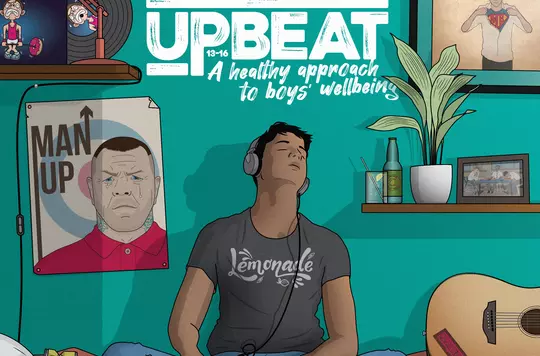20 June 2023
Man enough?
Simon Hope

Simon Hope grapples with what the Bible says about being masculine.
What is a man? Is he big, tall, tough, rough, grumpy, hairy, scary? Perhaps you fit all these words – perhaps none!
When we think of traditional masculine stereotypes, the first words that come to mind could be ‘strong’, ‘competitive’ or ‘bold’, but it’s impossible to simplify 50 per cent of the world’s population to a single description. If we think about traditional father stereotypes, for instance, these words might become ‘provider’ or ‘protector’.
When these stereotypes are lived out in a godly way, they can be quite beautiful. But a stereotype isn’t a guarantee; not everyone is the same, and there are lots of men who don’t fit this specific brand of masculinity.
Unfortunately, this is often seen as a bad thing. In books, TV and film, if a man is weak, apathetic or shy, he is usually a sidekick, comic relief or the villain – Beauty and the Beast’s LeFou fits all three! If a man with these attributes happens to be the main character, he’s most likely expected to overcome them before the end of the story. And how many times have men been mocked for doing something that’s considered unmanly or feminine?
Left unchecked, the fear of ‘not being man enough’ risks warping into a picture of toxic masculinity that encourages men to disregard women’s opinions, that tells boys it’s wrong to cry, that berates stay-at-home husbands for not being ‘the breadwinner’.
This is the thinking capitalised upon by some people today, such as controversial influencer Andrew Tate. Tied with an increased focus in society on the rights of women and other groups, some men can feel de-centralised or less important than they feel they deserve. This perceived attack on their sense of self can lead to feelings of insecurity, anger and hate – a dangerous pipeline for anyone to go down.
While I trust this isn’t happening within Army halls, this is the wider world that young men today face.
The counter, of course, is living out biblical masculinity. But what does that mean?
Our first stop – perhaps unsurprisingly – is Jesus. Born to a lowly carpenter, described as meek and mild, but with a passion that turned over tables and changed the world, Jesus displayed a wide breadth of what it means to be a man. This image of masculinity celebrates kindness over dominance (see Luke 8:40–48), patience over blind rage (see James 1:19), vulnerability over emotional distance (see Mark 14:32–34).
But it doesn’t stop there. From the simplicity of the Son, Scripture surveys the spectrum of masculine stereotypes, whether it’s the strong Samson or the sage Solomon. Importantly, the Bible doesn’t say it’s wrong to be masculine in the traditional way we might think of it, and even encourages men to be strong for others (see 1 Corinthians 16:13). But equally it doesn’t undervalue sensitivity (see 1 Peter 3:8) and gentleness (see Proverbs 15:1).
Men can be strong (see Judges 14:6), hairy (see Genesis 27:11) and steadfast (see Mark 8:33), but they also dance (see 2 Samuel 6:14 and 15) and cry (see John 11:35).
It’s impossible to accurately describe biblical masculinity in its entirety, because men can be so many things – at the end of the day, everyone is made in the image of God.
Written by

Simon Hope
Editorial Assistant
Discover more

Major Julian Watchorn reflects on God’s example of unchanging love.

A healthy approach to boys' wellbeing, Upbeat helps 13-16 year old young men develop their emotional literacy.

Bethany Gibson considers how equity is essential to fullness of life for all.

Support, training and resources to inspire families and individuals to flourish and develop in their faith journey.